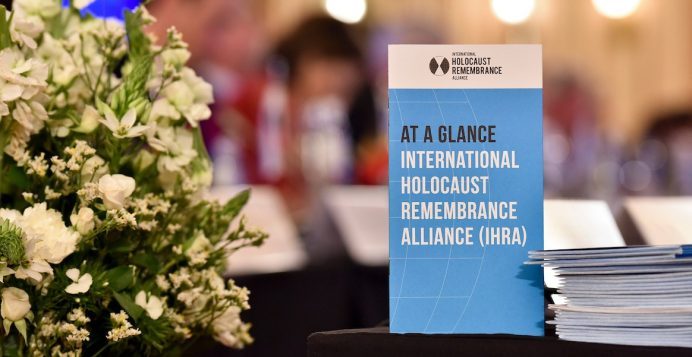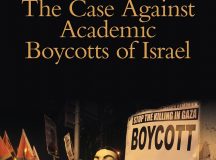This call is authored by the Steering Committee for the Network of Engaged Canadian Academics. Inspired by the success of the Academic Engagement Network (academicengagement.org), an independently run, non-partisan, non-profit organisation headquartered in the United States, a Canadian network, the Network of Engaged Canadian Academics (NECA) has been established, also a non-partisan organisation, specifically for faculty affiliated with Canadian universities. NECA is committed to genuine fairness, inclusivity and respect for the dignity of all people. The call was authored by Cary S. Kogan, University of Ottawa; Deidre Butler, Carleton University; Jan Grabowski, University of Ottawa; Haskel Greenfield, University of Manitoba; Yael Halevi-Wise, McGill University; Stuart Kamenetsky, University of Toronto Mississauga; Hernan Tesler-Mabe, Western University; Pamela Walker, Carleton University.
Canadian campuses have witnessed a disturbing surge of antisemitism including displays of swastikas, bans on kosher food, and reckless use of well-worn tropes to describe Jewish people. [1] As a group of concerned academics, we cannot ignore this alarming trend that threatens the safety and well-being of Jewish students and faculty. Canadian campuses have also seen a rise of one-sided portrayals of the Israeli-Palestinian conflict. Student councils and faculty unions passed motions blaming Israel solely for the conflict, often using inflammatory language that draws on antisemitic tropes to depict Israel, the only Jewish state where nearly half the world’s Jews reside. This creates an environment lacking respect, balance, civility, and objectivity, which are essential in a university setting. Consequently, Jewish students and faculty find themselves excluded and isolated, unable to express their Jewish identity fully.
Some have even gone as far as denying Jewish people the right to define their lived experience of antisemitism by repudiating the International Holocaust Remembrance Alliance’s Working Definition of Antisemitism (IHRA), falsely claiming that it undermines academic freedom by silencing criticism of Israel.[2] One such organisation is the Canadian Association of University Teachers (CAUT), which represents 125 universities and colleges.[3] IHRA is the internationally accepted definition of antisemitism developed through extensive consultations. It succinctly defines antisemitism as a certain perception of Jews, expressed as hatred toward Jews or Jewish institutions. Importantly, IHRA aligns with the accepted definition of discrimination under federal and provincial anti-discrimination laws and was adopted by the Canadian government and several provincial and municipal governments.[4] It is also supported by numerous universities in the United Kingdom (UK), the UN, the EU, the Global Imams Council, and the Council of Europe. Importantly, a new report just issued by the UK’s Parliamentary Taskforce on Antisemitism in Higher Education categorically refutes the false assertion that IHRA stymies academic freedom.[5]
In the UK, where IHRA has been implemented in higher education rather than maligned, the Parliamentary Taskforce on Antisemitism in Higher Education provides the clearest evidence to date that IHRA is essential to combatting antisemitism on campuses. The report states unequivocally, ‘[t]he International Holocaust Remembrance Alliance’s definition of antisemitism has neither compromised nor chilled free speech in any of the 56 Universities with which we engaged. This demonstrates that it is being used appropriately, as any suggestion that it should be a restrictor on academic freedom is to misread or misinterpret the definition. It is a working definition, not a legal definition and that is its strength.’
The CAUT’s repudiation of IHRA actually limits academic freedom by discouraging institutions from employing this widely accepted definition of antisemitism. By defaming IHRA, these motions deny faculty members the ability to identify and address instances of antisemitism, infringing on their rights under university policies and provincial human rights laws. Such actions likely violate university policies and Canadian human rights law.
CAUT and other faculty unions claim to champion social justice, yet they deny Jews the right to define their experiences of racism and express their identity. For most Jews this identity includes a connection to their historic, cultural, and ancestral homeland. This denial is particularly troubling because Jews endured a genocide resulting in the murder of a third of the world’s Jewry in the last century alone. Jews have a right to self-determination, including the right to define what constitutes antisemitism, and the IHRA working definition provides the necessary framework. By opposing IHRA, CAUT and faculty unions further alienate themselves from their members, undermine their credibility, and weaken the collective power they possess. Union leaders have a fiduciary responsibility to all members, and denying Jews autonomy to define their experiences and identity goes against the principles of social justice and unions’ mandate of fair representation. Rescinding anti-IHRA motions would restore CAUT’s credibility as legitimate representatives of all members.
It is high time we confront the scourge of antisemitism and address its manifestation on our Canadian campuses. By taking decisive action and ensuring that Jewish students and faculty feel safe, respected, and included, we can cultivate an atmosphere of genuine academic freedom and social justice for all. We urge faculty, staff, and students to take the time to educate themselves about Judaism, the history of Zionism, and the history of antisemitism. This will foster an environment of dignity and respect that every member of the Canadian community deserves.
[1] See the following: https://www.queensjournal.ca/story/2022-10-21/university/antisemitic-vandalism-occurs-in-albert-street-residence/; https://thevarsity.ca/2021/12/03/scsu-removes-kosher-food-section-from-bds-policy/; Kuper, A. ‘Reflections on addressing antisemitism in a Canadian faculty of medicine’. Can. Med. Ed. J. 2022 Dec.; https://journalhosting.ucalgary.ca/index.php/cmej/article/view/76086; https://biv.com/article/2023/02/ubc-professor-arranged-venue-promoted-lecture-anti-racism-consultant-accused; https://vancouver.citynews.ca/2021/08/03/ubc-antisemitism-hate-crime/
[2] https://www.holocaustremembrance.com/resources/working-definitions-charters/working-definition-antisemitism
[3] https://council.caut.ca/sites/default/files/motions_resolutions_for_caut_council_website-en.pdf, see Agenda Item #10
[4] https://www.canada.ca/en/canadian-heritage/campaigns/anti-racism-engagement/anti-racism-strategy.html
[5] Understanding Jewish Experience in Higher Education, Parliamentary Taskforce on Antisemitism in Higher Education. May 2023. https://antisemitism.org.uk/wp-content/uploads/2023/05/Understanding-Jewish-Experience-in-Higher-Education.pdf



































